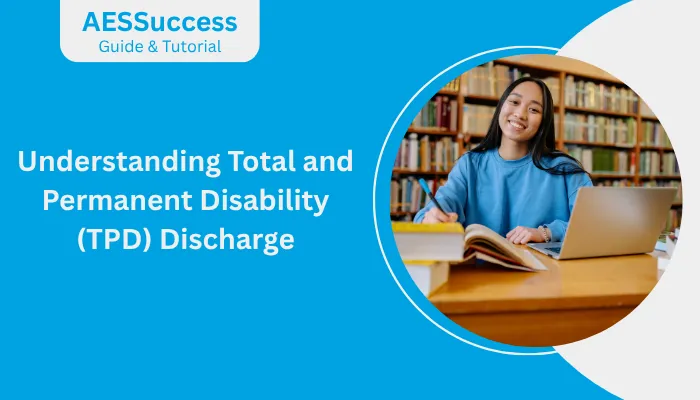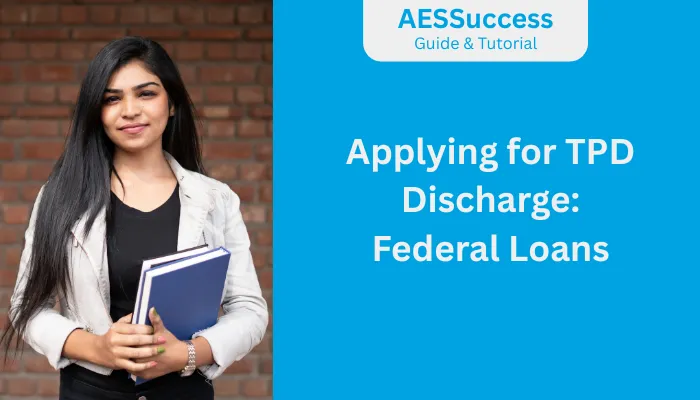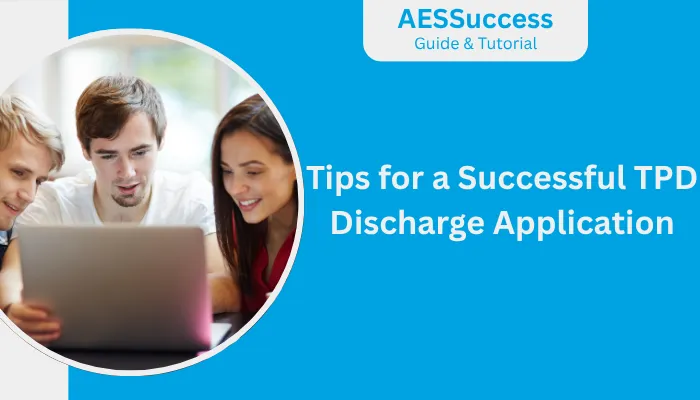Hey there! If you’re drowning in student loan debt and dealing with a disability, I feel you. Years ago, I watched a close friend struggle with student loan burden relief after a life-altering injury. That’s when I learned about AESsuccess student loan forgiveness and the total and permanent disability discharge (TPD) program.

It’s a game-changer for folks who can’t work due to medical issues. I’m here to walk you through loan forgiveness programs, especially TPD discharge, like a friend explaining it over coffee. Let’s dive into how you can use platforms like StudentAid.gov and AESsuccess Login (AESsuccess loan forgiveness application) processes to lighten your load.

Understanding Total and Permanent Disability (TPD) Discharge
So, what’s TPD discharge? It’s a federal program that wipes out your federal student loan forgiveness if you have a severe disability. Think of it as the government saying, “You’ve got enough on your plate; let’s cancel those loans.”
It applies to Direct Loans, FFEL, and Perkins Loans, but not private ones (we’ll get to those). I’ve seen folks think it’s too good to be true—spoiler: it’s real, but you need to prove your condition.
Total and permanent disability discharge is for those with a medically determinable impairment that stops you from working or is expected to last forever (or, sadly, result in death). Veterans with Department of Veterans Affairs (VA) TPD discharge eligibility, like a 100% service-connected disability, can also qualify. It’s not just about disability student loan forgiveness; it’s about giving you breathing room.
Here’s the breakdown:
- Applies to: Federal student loan forgiveness (not Public Service Loan Forgiveness (PSLF) or Teacher Loan Forgiveness—those are different beasts).
- Key Condition: A doctor, the VA, or Social Security disability student loan discharge paperwork must confirm your disability.
- Why It Matters: It’s one of the best student loan discharge options for those who can’t earn due to health issues.
My friend? He used StudentAid.gov/TPD-Discharge to start his journey. You can too—it’s a solid platform for navigating student loan forgiveness. Let’s keep going.
With TPD clear, let’s tackle who qualifies for student loan forgiveness and how to prove it.
Who Qualifies for TPD Discharge?
Alright, let’s get to the nitty-gritty: who qualifies for student loan forgiveness under TPD? Not everyone with a health issue qualifies, and that’s where some folks get tripped up.
I once thought a bad back would cut it—1000% WRONG. You need a medical condition for TPD discharge that’s severe, like a chronic illness or injury preventing substantial gainful activity (fancy term for “can’t work a regular job”).
Here’s what you need for TPD discharge requirements:
- Physician Certification: A doctor must confirm your permanent disability student loan discharge eligibility.
- Veteran Status: Got a VA letter saying you’re 100% disabled or unemployable? You’re in for veteran student loan forgiveness.
- Social Security: Receiving SSDI or SSI? That’s a ticket to Social Security disability student loan discharge.
- Duration: Your condition must last 60+ months or be terminal.
Check this table for clarity:
| Eligibility Type | What You Need |
|---|---|
| Medical Impairment | Doctor’s note for medical conditions for TPD discharge |
| Veteran Disability | VA proof for Department of Veterans Affairs (VA) TPD discharge |
| SSA Benefits | SSDI/SSI documents for Social Security disability student loan discharge |
| Duration | Proof condition is long-term or terminal |
Wondering, “Is my student loan eligible for forgiveness?” Use StudentAid.gov to check your loan type. If it’s federal, you’re likely good. Private loans? That’s trickier—hold tight. Do I qualify for student loan discharge? If you fit these criteria, you’re on the right track.
Now that you know who qualifies, let’s walk through how to apply for student loan discharge.

Applying for TPD Discharge: Federal Loans
Here’s where the rubber meets the road: how to apply for student loan discharge.
I helped my friend with his student loan forgiveness application process, and trust me, organization is your best friend. The U.S. Department of Education runs the show, and StudentAid.gov/TPD-Discharge is your go-to platform. Here’s how to nail it:
- Reach Out: Contact the TPD team:
- Phone: 1-800-433-3243 (super helpful folks!)
- Email: [email protected]
- Website: StudentAid.gov/TPD-Discharge
- Gather Paperwork: You’ll need documentation for loan forgiveness—think doctor’s notes, VA letters, or SSDI proof.
- Mail It: Send your student loan forgiveness forms to:
- Regular Mail: U.S. Department of Education, P.O. Box 300010, Greenville, TX 75403
- Overnight: 121 South 13th Street, Suite 201, Lincoln, NE 68508
- Wait and Watch: If approved, you’ll face a three-year monitoring period to ensure you’re still struggling with student loan debt.
Pro Tip: Use StudentAid.gov to track your application—it’s a lifesaver for navigating student loan forgiveness. Watch out for:
- Mistakes: Incomplete forms can delay student loan cancellation.
- Income Checks: Earning too much during monitoring can undo your discharge.
- Taxes: Forgiven loans might be taxable, so talk to a pro.
My friend’s application took three months, but seeing his student loan burden relief? Worth it. This is a cool tip: double-check your AESsuccess Student Loan Forgiveness forms before sending!
Federal loans done! Now, let’s explore alternatives to student loan repayment for private loans.
TPD and Private Student Loans
Private loans are the wild west of student loan discharge options. Unlike federal student loan forgiveness, there’s no standard TPD discharge for private loans.
I learned this the hard way when a cousin asked about his private loans with AESsuccess Repayment Plans. Spoiler: AESsuccess mainly handles federal loans, so for private ones, you’re calling your lender directly.
Here’s how to tackle getting rid of student loans with private lenders:
- Contact Your Lender: Ask about AESsuccess contact for loan forgiveness-style policies (even if it’s not AESsuccess). Some offer disability student loan forgiveness.
- Check Terms: Look for permanent disability student loan discharge clauses in your contract.
- Push Hard: No program? Negotiate solutions for student loan debt like hardship relief.
It’s not as smooth as federal loan forgiveness programs, but persistence pays off. Use your lender’s website or call center to explore how to get rid of student loans legally.
Private loans covered! Let’s wrap up with steps to apply for TPD discharge and more tips.

Tips for a Successful TPD Discharge Application
You’re almost there! Whether you’re chasing AESsuccess student loan relief or another loan discharge, these tips will help you crush it. I’ve seen applications fail over silly errors—don’t be that person. Here’s how to ace it:
- Verify Documents: Ensure your documentation for loan forgiveness is complete. Missing a signature? Disaster.
- Stay Organized: Track everything on StudentAid.gov for federal loans.
- Follow Up: No response? Call AESsuccess contact for loan forgiveness or the TPD line.
- Get Help: Groups like the National Disability Institute can guide you.
- Know the Monitoring Period: Federal loans require three years of checks—don’t mess it up.
This is a cool tip: save copies of everything. New student loan forgiveness programs or updates on student loan forgiveness might pop up, so check student loan forgiveness news on StudentAid.gov.
With these solutions for student loan debt, you’re ready to tackle TPD discharge like a pro.
Conclusion
Dealing with student loan debt and a disability is no joke, but AESsuccess student loan forgiveness and TPD discharge can be your lifeline. Whether it’s federal loan forgiveness programs or private student loan discharge options, platforms like StudentAid.gov make navigating student loan forgiveness easier.
Get your documentation for loan forgiveness ready, follow the steps to apply for TPD discharge, and don’t give up. You’ve got this, and I’m rooting for you to find student loan burden relief!
